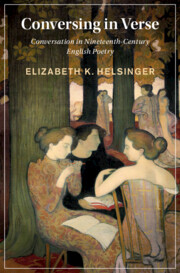Book contents
- Conversing in Verse
- Cambridge Studies in Nineteenth-Century Literature and Culture
- Conversing in Verse
- Copyright page
- Contents
- Figures
- Acknowledgments
- Chapter 1 Introduction: A Poetics of Encounter
- Chapter 2 Dialogue and the Idyll: Tennyson and Landor
- Chapter 3 Performing Conversation: Swinburne and Robert Browning
- Chapter 4 Projects of Animation: Coleridge and Clare
- Chapter 5 Ecphrastic Questions: Dante Gabriel Rossetti and Michael Field
- Chapter 6 Cruel Intimacies: Christina Rossetti and Thomas Hardy
- Epilogue
- Notes
- Bibliography
- Index
- Cambridge Studies in Nineteenth-Century Literature and Culture
Epilogue
Louise Glück’s Secret Conversations
Published online by Cambridge University Press: 21 July 2022
- Conversing in Verse
- Cambridge Studies in Nineteenth-Century Literature and Culture
- Conversing in Verse
- Copyright page
- Contents
- Figures
- Acknowledgments
- Chapter 1 Introduction: A Poetics of Encounter
- Chapter 2 Dialogue and the Idyll: Tennyson and Landor
- Chapter 3 Performing Conversation: Swinburne and Robert Browning
- Chapter 4 Projects of Animation: Coleridge and Clare
- Chapter 5 Ecphrastic Questions: Dante Gabriel Rossetti and Michael Field
- Chapter 6 Cruel Intimacies: Christina Rossetti and Thomas Hardy
- Epilogue
- Notes
- Bibliography
- Index
- Cambridge Studies in Nineteenth-Century Literature and Culture
Summary
The Epilogue moves forward to consider briefly selected poems from the twentieth century by T. S. Eliot, Elizabeth Bishop, and especially Louise Glück, who in her Nobel prize acceptance speech in December 2020 invoked an earlier tradition of poems that seem to invite the reader into secret conversations. These conversations are not, in fact, so secret, as Conversing in Verse has argued. The poems Glück cites (by Blake, Dickinson, and T. S. Eliot) include voices conversing under difficult conditions – as do her own poems, particularly in two collections, The Wild Iris and Meadowlands. There, as in the poetry that has been the subject of this study, misunderstandings and failed encounters are as frequent as successful ones. Handled with Glück’s ironic, witty self-awareness, they too are desperate conversations – with other people, with an impatient God, or with the nonhuman phenomena of the world. Poetry is after all sociable; it continues, against all odds, to converse.
- Type
- Chapter
- Information
- Conversing in VerseConversation in Nineteenth-Century English Poetry, pp. 155 - 159Publisher: Cambridge University PressPrint publication year: 2022

